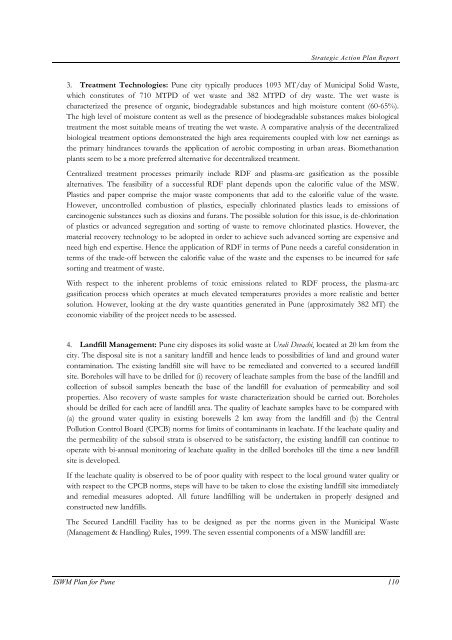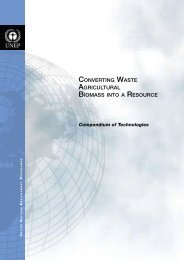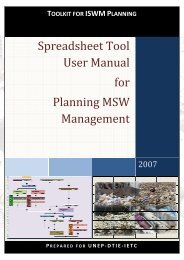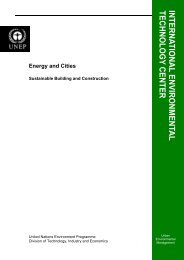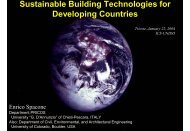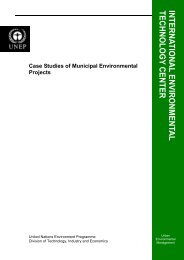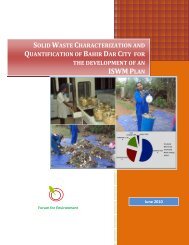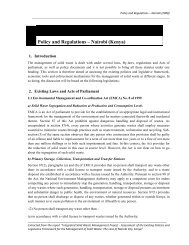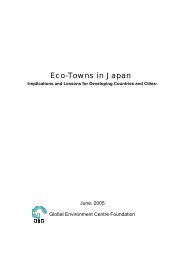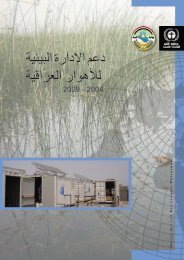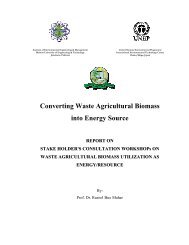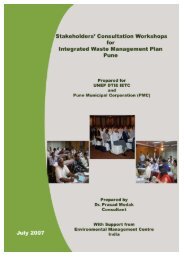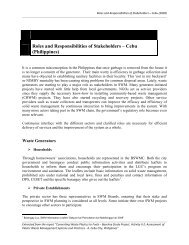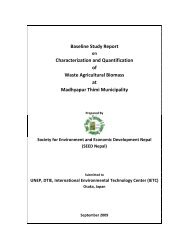Strategic Action Plan - International Environmental Technology Centre
Strategic Action Plan - International Environmental Technology Centre
Strategic Action Plan - International Environmental Technology Centre
Create successful ePaper yourself
Turn your PDF publications into a flip-book with our unique Google optimized e-Paper software.
<strong>Strategic</strong> <strong>Action</strong> <strong>Plan</strong> Report<br />
3. Treatment Technologies: Pune city typically produces 1093 MT/day of Municipal Solid Waste,<br />
which constitutes of 710 MTPD of wet waste and 382 MTPD of dry waste. The wet waste is<br />
characterized the presence of organic, biodegradable substances and high moisture content (60-65%).<br />
The high level of moisture content as well as the presence of biodegradable substances makes biological<br />
treatment the most suitable means of treating the wet waste. A comparative analysis of the decentralized<br />
biological treatment options demonstrated the high area requirements coupled with low net earnings as<br />
the primary hindrances towards the application of aerobic composting in urban areas. Biomethanation<br />
plants seem to be a more preferred alternative for decentralized treatment.<br />
Centralized treatment processes primarily include RDF and plasma-arc gasification as the possible<br />
alternatives. The feasibility of a successful RDF plant depends upon the calorific value of the MSW.<br />
Plastics and paper comprise the major waste components that add to the calorific value of the waste.<br />
However, uncontrolled combustion of plastics, especially chlorinated plastics leads to emissions of<br />
carcinogenic substances such as dioxins and furans. The possible solution for this issue, is de-chlorination<br />
of plastics or advanced segregation and sorting of waste to remove chlorinated plastics. However, the<br />
material recovery technology to be adopted in order to achieve such advanced sorting are expensive and<br />
need high end expertise. Hence the application of RDF in terms of Pune needs a careful consideration in<br />
terms of the trade-off between the calorific value of the waste and the expenses to be incurred for safe<br />
sorting and treatment of waste.<br />
With respect to the inherent problems of toxic emissions related to RDF process, the plasma-arc<br />
gasification process which operates at much elevated temperatures provides a more realistic and better<br />
solution. However, looking at the dry waste quantities generated in Pune (approximately 382 MT) the<br />
economic viability of the project needs to be assessed.<br />
4. Landfill Management: Pune city disposes its solid waste at Urali Devachi, located at 20 km from the<br />
city. The disposal site is not a sanitary landfill and hence leads to possibilities of land and ground water<br />
contamination. The existing landfill site will have to be remediated and converted to a secured landfill<br />
site. Boreholes will have to be drilled for (i) recovery of leachate samples from the base of the landfill and<br />
collection of subsoil samples beneath the base of the landfill for evaluation of permeability and soil<br />
properties. Also recovery of waste samples for waste characterization should be carried out. Boreholes<br />
should be drilled for each acre of landfill area. The quality of leachate samples have to be compared with<br />
(a) the ground water quality in existing borewells 2 km away from the landfill and (b) the Central<br />
Pollution Control Board (CPCB) norms for limits of contaminants in leachate. If the leachate quality and<br />
the permeability of the subsoil strata is observed to be satisfactory, the existing landfill can continue to<br />
operate with bi-annual monitoring of leachate quality in the drilled boreholes till the time a new landfill<br />
site is developed.<br />
If the leachate quality is observed to be of poor quality with respect to the local ground water quality or<br />
with respect to the CPCB norms, steps will have to be taken to close the existing landfill site immediately<br />
and remedial measures adopted. All future landfilling will be undertaken in properly designed and<br />
constructed new landfills.<br />
The Secured Landfill Facility has to be designed as per the norms given in the Municipal Waste<br />
(Management & Handling) Rules, 1999. The seven essential components of a MSW landfill are:<br />
ISWM <strong>Plan</strong> for Pune 110


